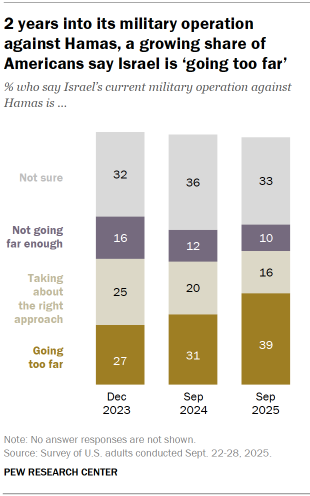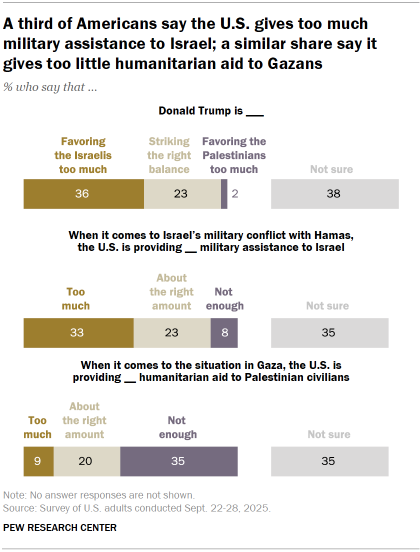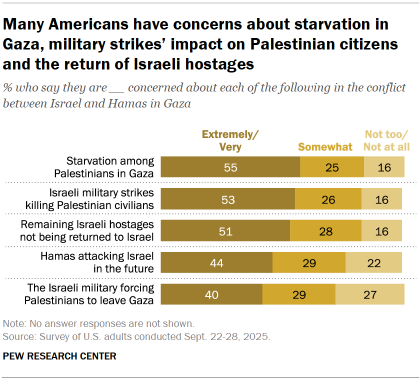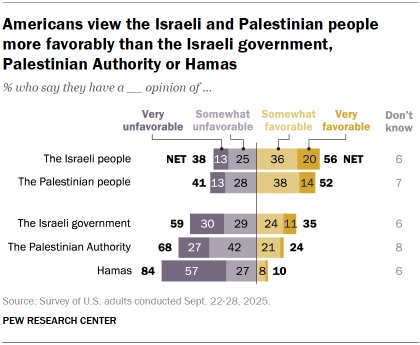Nearly two years into Israel’s military operation against Hamas in the Gaza Strip following Hamas’ Oct. 7, 2023, attack on Israel, Americans’ skepticism of Israel’s operation and its government is higher than at earlier points in the conflict:
- 39% now say Israel is going too far in its military operation against Hamas. This is up from 31% a year ago and 27% in late 2023.
- 59% now hold an unfavorable opinion of the Israeli government, up from 51% in early 2024.

Today, 16% say Israel is taking about the right approach to the conflict, and 10% say it isn’t going far enough. A third of adults say they aren’t sure.
Large shares of Americans continue to express uncertainty across several questions about the ongoing war in the Middle East and the U.S. government’s response.
A new national survey from Pew Research Center, conducted Sept. 22-28 among 3,445 adults, finds that 42% of U.S. adults disapprove of the Trump administration’s response to the conflict between Israel and Hamas, while 30% approve. Roughly a quarter (27%) say they are not sure.
(The survey was conducted before Trump and Israeli Prime Minister Benjamin Netanyahu announced earlier this week that Israel had agreed to a U.S.-led peace plan, which Hamas says it’s considering.)
The share of Americans who say President Donald Trump is favoring the Israelis too much has increased 5 percentage points since March (from 31% to 36%). The share saying Trump is striking the right balance has declined 6 points (from 29% to 23%). Very few (2%) say Trump is favoring the Palestinians too much, while nearly four-in-ten (38%) aren’t sure.

Republicans are far more likely than Democrats to approve of Trump’s handling of the conflict and to say he is striking the right balance between the Israelis and the Palestinians. But the shares saying Trump is favoring the Israelis too much have risen in both partisan coalitions.
U.S. military assistance to Israel
A third of adults (33%) say the United States is providing too much military assistance to Israel. Far fewer (8%) say the U.S. is not providing Israel enough military assistance. About a quarter (23%) say it is providing about the right amount, and 35% aren’t sure.
U.S. humanitarian aid to Palestinian citizens
By comparison, 35% say the U.S. is not providing enough humanitarian aid to Palestinian citizens in Gaza, while 9% say it is providing too much humanitarian aid. Two-in-ten say the U.S. is providing about the right amount, and 35% aren’t sure.
For more about Americans’ views of the U.S. response to the conflict – including among age and partisan groups – read Chapter 1.
Concerns about the conflict
Eight-in-ten Americans say they are at least somewhat concerned about starvation among Palestinians in Gaza, Israeli military strikes killing Palestinian civilians and the remaining Israeli hostages not being returned to Israel.

At least half of Americans say they are extremely or very concerned about these things.
Clear majorities of Americans also express at least some concern about Hamas attacking Israel in the future (74%) and the Israeli military forcing Palestinians to leave Gaza (69%). About four-in-ten say they are extremely or very concerned about these possibilities.
These concerns are widespread among both Republicans and Democrats. However, there are partisan differences in the level of some concerns:
- Democrats are more likely than Republicans to say they are extremely or very concerned about Israeli military strikes in Gaza killing Palestinian civilians, starvation in Gaza, and the possibility of Palestinians being forced to leave Gaza.
- Republicans are more likely than Democrats to say they are extremely or very concerned about the possibility of Hamas attacking Israel in the future.
- There is no partisan gap in concerns about the remaining hostages not being returned to Israel.
Details on these questions can be found in Chapter 3.
Views of the Israelis, Palestinians and their leadership
Americans continue to hold much more positive views of the Israeli and Palestinian peoples than of their political leadership.
Today, 56% have a favorable view of the Israeli people, while 52% view the Palestinian people favorably. By contrast, 59% view the Israeli government unfavorably, while 68% say the same about the Palestinian Authority. Americans overwhelmingly view Hamas unfavorably (84%).

But Americans’ opinions of both the Israeli government and the Israeli people are less positive than they were in February 2024.
Today, 35% have a favorable view of the Israeli government, down from 41% in 2024.
And while 56% now view the Israeli people positively, that is down from 64% a year and a half ago.
Views of the Palestinian people, the Palestinian Authority and Hamas have not changed over the past year and a half.
There continue to be wide partisan gaps in some of these views:
- 70% of Democrats and Democratic-leaning independents view the Palestinian people favorably, compared with 37% of Republicans and GOP leaners.
- 55% of Republicans view the Israeli government positively, compared with just 18% of Democrats.
- Democrats are equally likely to have a favorable as unfavorable view of the Israeli people (48% each). By comparison, 67% of Republicans have a favorable view.
- 82% of Republicans and 56% of Democrats view the Palestinian Authority unfavorably.
- At least eight-in-ten in both parties view Hamas unfavorably.
Read Chapter 2 for more detail on Americans’ views of Israelis, Palestinian and their leadership, including views among Democrats and Republicans and by age groups.




